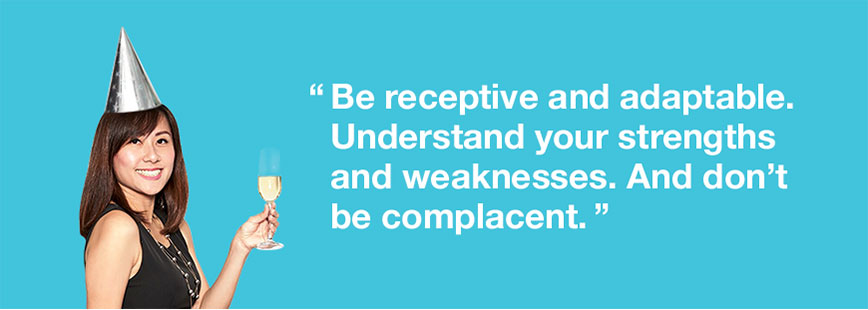A New Mindset for the Workforce of the Future
A New Mindset for the Workforce of the Future

On a mission to engage and teach the public about how they can embrace the evolving workforce through upskilling and reskilling, Haze and her dynamic team travel around Singapore to deliver up to 10 islandwide activations each week.
Instead of fearing the future, Haze promotes the notion of taking personal responsibility and believes that the solution lies in keeping our eyes on the latest trends and upgrading our skills accordingly.
1. Being open to change is the only way
While new technologies like blockchain and automation are often seen as threats, Haze views them as forward-thinking, new, fresh and exciting. “We have to learn how to coexist with automation,” said Haze. “They can make certain aspects of our jobs easier, but they won’t necessarily be able to replace certain core critical thinking skills.”
In terms of which specific skills to focus on, Haze advises that we have no choice but to open up to a fast-evolving and digital-centric future. “We’re progressing rapidly into an age of digitalisation and there’s no way back,” said Haze. “We have seen a particularly large surge of interest in SkillsFuture for Digital Workplace and people are beginning to see the importance and value in adaptive and soft skills in the workplace, and of course, technological skills.”
Haze
Working in the frontline, Haze has seen the public’s response to the changing workforce firsthand and remains optimistic. “Recently, I have found that more working adults (from the ages of 30 to 50) are embracing our message and becoming more receptive towards the idea of upskilling themselves.”
Conversely, she does offer a word of warning for those who resist change and fail to upgrade their skill set. “If you do not embrace change, you will soon see yourself being left behind,” she cautioned. “Start by practising Agile and LEAN thinking in the workplace — this will lead to organisational growth in the long run!”
2. Upskilling for immediate and future career success
Given that skill advancement is an ongoing journey, it is often overlooked by the more immediate and material need of securing your rice bowl. However, Haze advises that these contrasting demands actually go hand in hand in the long run. “Nobody is indispensable in the workforce,” said Haze. “See it as personal growth and adding skills as adding value to your career.”
Hailing communication as the “bread-and-butter” of the corporate world, Haze describes critical and analytical thinking as well as negotiation as essential skills to develop due to their applications both inside and outside of the workplace. “Along with the ability to automate the more mundane tasks, every Worker 4.0 should be equipped with these skills!” she remarked.
Haze also recommends finding out whether upskilling can result in more immediate financial rewards in your industry. “Certain trades and professions come with qualifications and certificates that guarantee a pay rise or promotion upon completion,” said Haze. “For example, there are Project Management Professional (PMP) and cybersecurity certifications.”

3. Embracing lifelong learning for lifelong advancement
With much of her time spent talking about the value of lifelong learning, does Haze actually follow this mindset herself? “I am actually a person who enjoys continuous learning!” she laughed. “Through continuous learning, we gain knowledge and new skills, and ultimately, better wages, welfare and work prospects. This is the ultimate goal we want to achieve.”
Asked who inspired her to develop a mindset of lifelong learning, Haze acknowledges the great political leader and thinker Mahatma Gandhi due to his practical educational philosophy and desire for it to contribute to the betterment of society. “He has a quote that goes, ‘Live as if you were to die tomorrow. Learn as if you were to live forever,’” recollected Haze. “And as Gandhi would say, education is not only about literacy but about all-round development.”
Accordingly, Haze urges that we cannot wait for the external environment to induce change. We need to look ahead to the future and change ourselves for a better tomorrow. “I want more people to understand that knowledge is something that is intangible,” said Haze. “It’s an investment that stays with you for life, and the more skills you pick up, the greater value there will be in your portfolio and your career.”
Asked if she had any final advice to learners, Haze summed up her thoughts: “Embrace change. Be receptive and adaptable. Understand your strengths and weaknesses. And don’t be complacent.”
This year, NTUC LearningHub celebrates 15 years of transforming people through accessible education. Since 2004, we have fulfilled over 2.3 million training places and transformed over 16,700 organisations.
Regardless of collar, age or nationality, we are here to help you evolve your skillset for an evolving future. For more information on how we can help, talk to our friendly Course Consultants at NTUC Trade Union House, Devan Nair Institute for Employment and Employability, LHUB @ Tampines Mall or any of our roadshows islandwide.
For Learners

How to Provide Effective Coaching and Feedback to Maximise Team Performance
Stories



.jpg/35c2504b-c682-453c-a957-5f41aa260654/)
